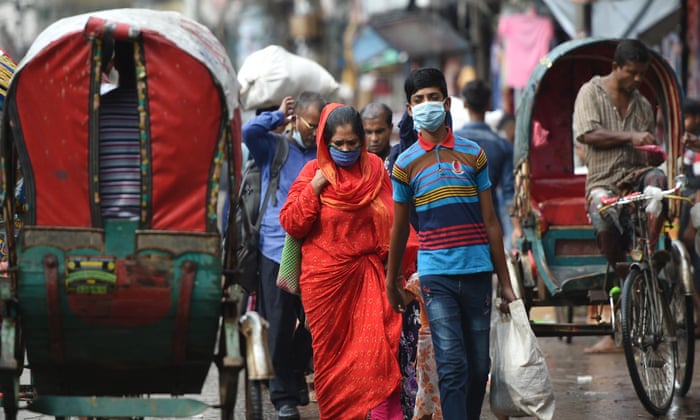No lost generation: can poor countries avoid the Covid trap?
We must act now to stop the pandemic inflicting long-term damage, says the head of the IMF
- UK economy shows signs of faltering before second Covid-19 wave
- IMF chief: Covid will widen inequality without global action
 |
Tue 29 Sep 2020 14.00 BST
Never before in living memory have so many lives and livelihoods across the world been disrupted at the same time. The International Monetary Fund estimates the pandemic’s loss to the global economy at around $12tn (£9.4tn) over 2020-21. The poorest countries – with limited resources and constrained capacity – are hit hardest: growth in low-income nations will be at a standstill this year, compared with 5% last year.
Without necessary action, this group of about 70 countries, representing more than 1 billion people, faces unprecedented human and economic devastation. The decades-long declining trend in global poverty is being pushed into reverse, with as many as 90 million additional people falling into extreme poverty, mostly in sub-Saharan Africa and south Asia.
Just this month, the UN warned of famine. There is also the fear that the pandemic will set back health progress for decades as well as reverse progress on other crucial fronts such as gender equality.
Just as people with weak immune systems are more vulnerable to the virus, so low-income countries with weak fundamentals are more prone to its economic effects. More than half of these countries were already at high risk of – or actually in – debt distress before the crisis began.
The pandemic has exacerbated this with a poisonous cocktail of external shocks: sharply falling exports and commodity prices, collapsing trade, evaporating tourism and less capital inflows. Remittances, which are the main source of income for many poor families, have been hit hard – by almost 20% in countries such as Bangladesh.
It is urgent that we act now to prevent “scarring” – long-term loss of human and economic capacity – in the poorest countries. Most importantly, we must secure access to opportunities – education, jobs, financing to start businesses – for the generation of young people upon whom the future of these countries depends. What needs to be done?
First, governments must prioritise health for a durable exit from the pandemic. Saving lives and saving livelihoods are two sides of the same coin. Given that lockdowns are difficult to sustain, this means combining investments in treatment capacity with targeted measures such as social distancing and contact tracing, and with an emphasis on the most vulnerable, including elderly people. Vietnam and Cambodia are examples of where this is happening.
Second, economic measures – especially fiscal ones – should be even more focused. The quality and effectiveness of domestic resource mobilisation and spending are at a premium. For example, protecting education is critical to avoid permanent damage to young people’s prospects. And there must be zero-tolerance of corruption. The crisis has exposed structural weaknesses in social protection systems and offers an opportunity to build stronger systems that can reach vulnerable populations.
Third, even while fighting the pandemic today, countries must look to transform their economies for a very different tomorrow – including by incentivising the transition to a climate resilient and low-carbon economy, and by building digital skills and infrastructure. For example, expanding internet access in sub-Saharan Africa by 10% could increase real per capita GDP growth by up to an estimated four percentage points.
Fourth, the international community must do even more. Helping low-income countries gain equitable access to vaccines is an imperative. So is securing universal access to the internet.
This demands an increase – not a decline – of aid resources in the form of grants, concessional loans and debt relief. Responding to the IMF and World Bank’s call, the G20 has suspended official bilateral debt payments from the poorest countries – freeing up about $5bn this year for 42 low-income countries. The initiative could be extended along with increased participation by commercial creditors.
The IMF is playing its part. We have tripled our capacity to provide zero-interest loans to low-income countries. We have disbursed over $30bn in emergency financing to 76 countries, including over $10bn to 47 low-income countries – without traditional conditions but with fiduciary safeguards. And we have given immediate debt relief, in grant form, to 29 of our poorest member countries.
This is a crisis like no other and we are responding like never before – particularly to support the most vulnerable countries and the most vulnerable people.
Make no mistake: without urgent action, we risk deepening the divide – globally –between the rich and poor. The impact will be profound – and not only in low-income countries. It risks reverberating throughout the world with increased inequality leading to economic and social upheaval: a lost generation in the 2020s whose after-effects will be felt for decades to come.
I do not see this outcome as inevitable. On the contrary, I believe that, working together, we can build forward to a better world for all.
To get there, we must act now.
-
Kristalina Georgieva is managing director of the International Monetary Fund


No comments:
Post a Comment
Note: only a member of this blog may post a comment.